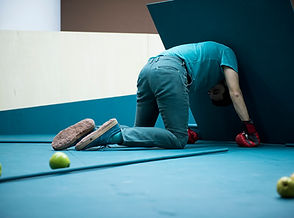space of production in dance
pérfida iguana
.jpg)
Um instante anterior
à extrema violência
2015 | 150 min
premiere season and
exhibition at galeria olido
são paulo
funding
ProAc - Programa de Ação Cultural do Governo do Estado de São Paulo - primeiras obras de dança (2014).
about
The dance is conceived with an aseptic and fictional landscape, in which two figures live together for two and a half hours. Situated between things, human and animal, the figures relate to each other through simple and distended actions over time, giving the public the possibility of viewing them through the time, distance and angle that they desire.
_.jpg)
.jpg)
.jpg)
.jpg)
.jpg)
credits
Concept and performance
Carolina Callegaro
Renan Marcondes
Scenic design
Zang&Zagatti
Collaboration
Andreia Yonashiro
Carlos Canhameiro
Original Track
André Bordinhon
Light design
Daniel Gonzalez
Production
Tetembua Dandara
Video filming and editing
Bruta Flor Filmes
photos: Mariana Chama
research
In Um instante anterior à extrema violência, the research interested in investigating new possibilities of the human, always central to the artists of Pérfida Iguana, assumed a laboratory form, as if the project of a future humanity (that would blur the border between animality and rationality) was no longer elaborated discursively, but tested in vitro. As if we exchanged the images of anatomy books and the concepts learned in the practice of somatic education techniques for strange and “incorrect” pictorial works (Eduardo Berliner's paintings were the main inspiration). We were looking for hybrid corporal states, between animal, thing and human, whose rules of coexistence were also guided by colors and abstract actions with objects, in which traces of humanity were recognized.
We have opposed ourselves to any humanist thought (in the sense of relying confidently on the power of what is already understood as human, a power that always ends up being inverted in dominating power) as well as any pretension of virtuosity of the body (based necessarily on pre-established concepts and patterns of beauty and virtue, in a “good” training that allows a “good” expressiveness); and in the opposite way of these common places, we build strange bodies to organizations easily recognizable as typical of the “human”, bodies that organize themselves horizontally in relation to the ground, that fall constantly, that move very slowly, exercising a hypothetical project of the future in which the body could no longer be recognized as human, as an erect subject dominating a nature of which it becomes owner.